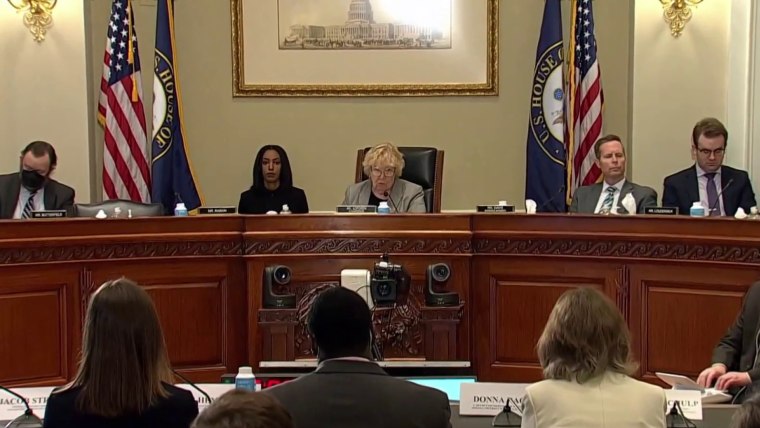Two days before the House was scheduled to vote on a bill concerning the domestic semiconductor chip manufacturing industry, Paul Pelosi, the husband of Speaker Nancy Pelosi, sold $5 million worth of stock in chipmaker Nvidia.
It doesn’t matter whether Paul Pelosi had inside information about the semiconductor bill or not. It looks awful.
Speaker Pelosi, D-Calif., denies having shared nonpublic information with her husband, but it doesn’t matter whether Paul Pelosi had inside information about the semiconductor bill or not. It looks awful.
It’s important that Congress pass a law prohibiting its members and their spouses from trading in individual stocks while in office. For years, such reform has faced considerable resistance from members of both political parties, including the speaker, but it is necessary if public confidence in Congress is to be restored. Democrats have been discussing a plan to introduce such legislation this month.
The problem that Paul Pelosi’s trade illustrates isn’t new. As far back as 1789, members of Congress traded in securities affected by their official duties. This included the states’ Revolutionary War debt securities that members of Congress furiously bought up on the market at a fraction of their face value before passing a bill, the Assumption Act, paying off these same debt securities at full face value. Sen. William Maclay of Pennsylvania complained at length about this and other unethical conduct in Congress in a diary.
Fast-forward 230 years. Thanks in part to our campaign finance system, which gives wealthy candidates an advantage, we have a Congress full of multimillionaires, many of whom trade in stocks while they vote on bills, conduct investigations and perform other official duties that affect the value of those stocks.
Such trading is a crime for unelected officials in the executive branch. The law imposes criminal penalties on nonelected federal employees who participate in government matters affecting their financial interests or the financial interests of their spouses. That includes matters affecting stocks in their portfolios.
Such a conflict of interest can be a felony for every federal employee except the president, the vice president and members of Congress, who passed the law making it illegal for other federal employees to perform official duties that make them richer.
Hypocrisy? Indeed.
The forthcoming bill from Democrats isn’t expected to criminalize such conflicts of interest for lawmakers, but it is expected to prohibit trading in individual stocks while in office. Questions remain about how committed President Joe Biden is to its passage, how many lawmakers will support it and whether there’s enough time to even get it passed.
Donna Nagy, a leading expert on insider trading law, and I wrote a December 2020 letter to House and Senate leadership about the need to ban congressional stock trading, but we never got a response from any of these leaders from either party.
It’s a conflict of interest for members of Congress to hold stocks in individual companies affected by their official duties.
On the morning of Jan. 6, 2021, we published an op-ed in Bloomberg Law calling for such a ban. Ironically, and as I’ve discussed here before, that was perhaps the only day members of Congress were sufficiently distracted by their official duties that few of them were trading stocks.
Nagy and I made a twofold argument. First, we argued, it is a conflict of interest for members of Congress to hold stocks in individual companies affected by their official duties. Members of Congress can, like most other American investors, hold diversified mutual funds. Mutual funds are explicitly exempt from conflict-of-interest rules for executive branch employees, as well as for federal judges.
This is because the small percentage of a mutual fund invested in a particular company, or even in a particular industry, doesn’t create a significant conflict of interest. Diversified mutual funds allow investors to realize market appreciation just like individual stocks, and unless an investor has unique stock market expertise (or inside information), mutual funds perform just as well as individual stocks with less risk.
Second, members of Congress do have inside information about legislation, congressional investigations and other matters that affect stock market prices. This has been a problem since the days Maclay complained about his colleagues more than 200 years ago. Today, insider trading in securities on the basis of misappropriated nonpublic information is illegal for everyone. Indeed, it’s a felony.
Just in case members of Congress believe themselves to be exempt from insider trading law, Congress in 2012 responded to repeated stock-trading scandals by passing the Stop Trading on Congressional Knowledge (STOCK) Act, which explicitly says members of Congress, like everyone else, can’t misappropriate information from their workplace for stock trading.
But the STOCK Act didn’t prohibit members and their spouses from trading in individual stocks when they don’t have inside information or when it can’t be proved that they have insider information. Given the difficulty for the Securities and Exchange Commission or federal prosecutors in investigating what goes on in congressional offices, the stench of corruption still remains.
Americans are fed up with corruption and the appearance of corruption in Congress. Congress should pass a ban on trading in individual stocks by members and their spouses. Members who want to play the market instead of representing the public are always free to resign or not run for re-election. If they won’t, voters should make the choice for them in November.
Techyrack Website stock market day trading and youtube monetization and adsense Approval
Adsense Arbitrage website traffic Get Adsense Approval Google Adsense Earnings Traffic Arbitrage YouTube Monetization YouTube Monetization, Watchtime and Subscribers Ready Monetized Autoblog
from Stock Trading – My Blog https://ift.tt/relh8dX
via IFTTT







